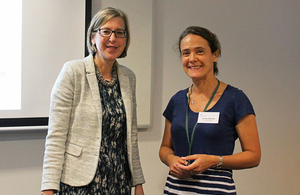Home Office hosts joint summit on ‘acid attacks’
The Home Office has held a joint event with the NPCC to bring together law enforcement, government, retailers and medical experts to tackle the issue of ‘acid attacks’.

The aim of the event was to explore how acids and corrosive substances are being used in criminal activity and to find ways to reduce it. The different agencies shared information over the nature of attacks and what action is being taken.
Addressing the summit, Sarah Newton, Minister for Crime, Safeguarding and Vulnerability, said:
The government is very concerned about the use of acid and other corrosives in violent attacks. They often leave victims with terrible life changing injuries and trauma.
There is no place in society for these sickening attacks and we want to work with all agencies to tackle these and prevent further victims. However, where they do occur we must ensure that victims are provided with all the necessary support they require, in terms of ongoing medical and mental health support and support through the Criminal Justice System.
The meeting heard there was no one driver for acid attacks as cases covered a wide range of motivations for the attacks including gang involvement, domestic abuse or honour-based violence and serious organised crime - in addition to random attacks - and that the joint approach must reflect this.
Sarah Newton stressed the importance of the government and other agencies working together to prevent the horrendous attacks from happening.
The Minister added:
The government’s approach to tackling the use of acid and other corrosive substances in violent attacks is centred on four key strands. Firstly, working closely with the police to ensure that the policing response is effective. Secondly, we must ensure that the current legislation is used effectively and that sentencing guidelines reflect the severity of these offences. Thirdly, we are working with retailers to see how they can restrict access to the most harmful products and understand the current requirements under the Poisons Act 1972. Finally, it is important that victims of these attacks are at the heart of our response.
We must ensure that there is appropriate support available to victims, from the initial medical response to giving evidence in court and beyond. We must ensure victims feel confident in coming forward to report these crimes and give evidence and that perpetrators of these horrific crimes are brought to justice.
National Police Chiefs Council (NPCC) lead for Corrosive Attacks, Assistant Chief Constable Rachel Kearton, who also spoke at the meeting, said:
The use of corrosive substances to commit acts of violence is an extreme violent crime that aims to cause lasting physical and emotional damage to victims. Police forces are dealing with a number of high profile cases in recent months and we are continuing to collect data from police forces across England and Wales to understand the scale and extent of these attacks and develop our ability to support and safeguard victims.
While it is virtually impossible to ban the sale of all corrosive substances as many are household products available over the counter at supermarkets and DIY stores, including for example bleach and drain cleaner, we are working closely with the Home Office and retailers themselves to determine how we can enhance our intelligence picture to keep these products from people who intend to cause harm.
I am sure that some offences of this type are not reported as a crime to the police. Crimes such as this should not go unreported and I would urge anyone who is a victim of this type of attack to report it so that we can deal with the matter positively and sensitively.